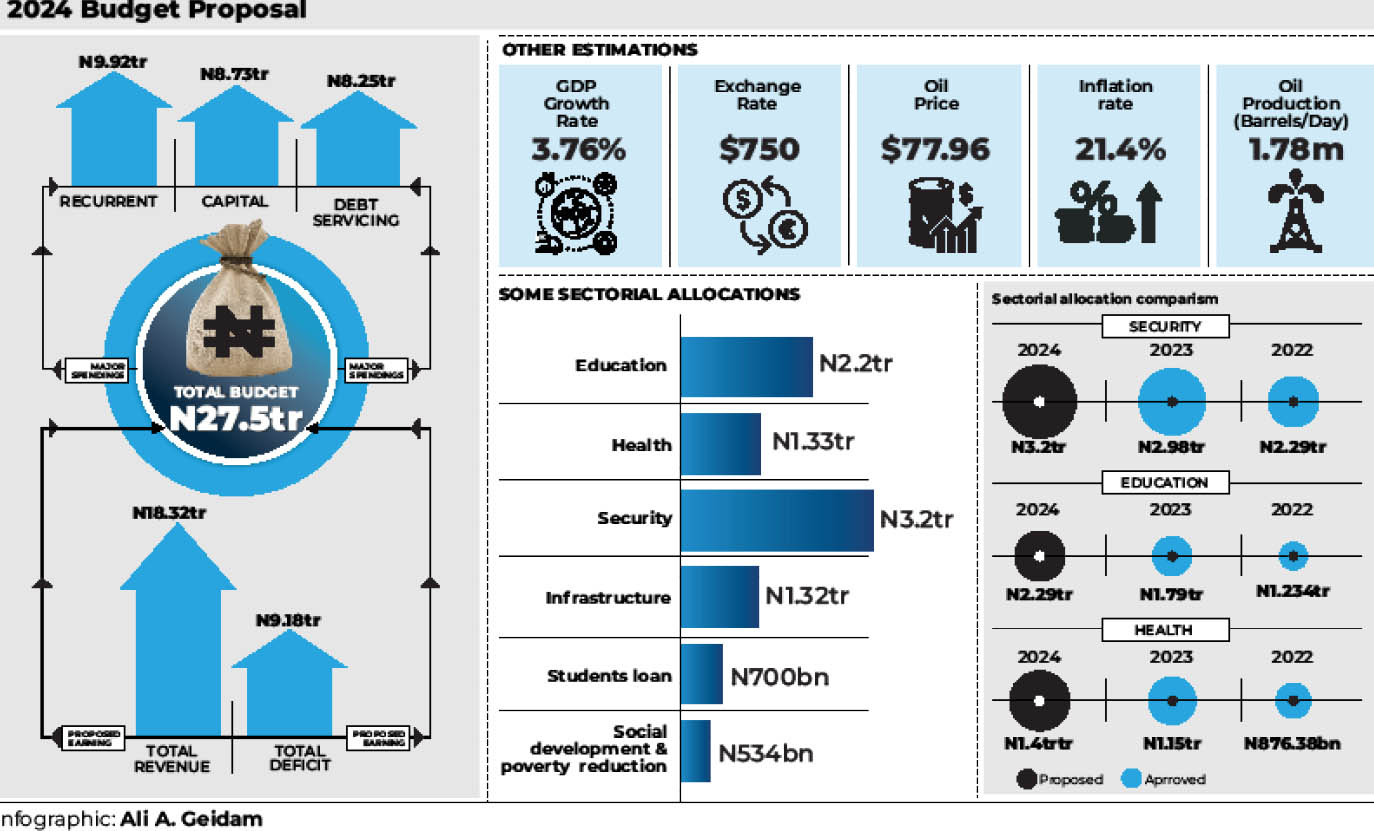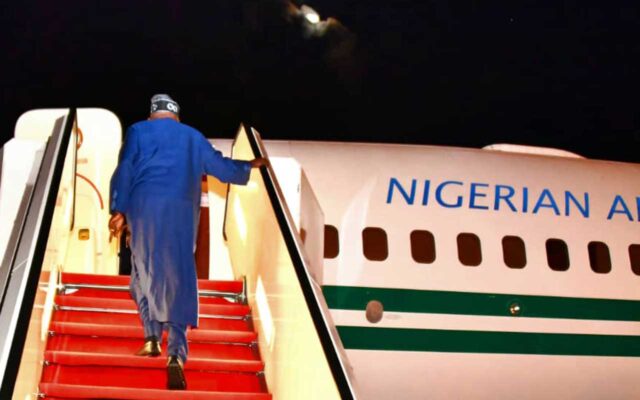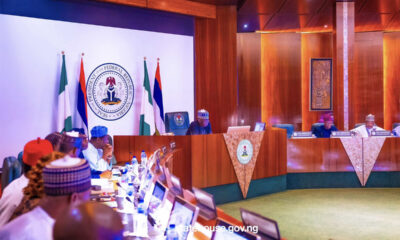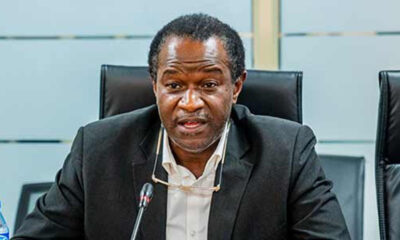News
21 state govts solicit N1.65tn loans to fund 2024 budgets – Report

21 state govts solicit N1.65tn loans to fund 2024 budgets – Report
Twenty one states of the federation are seeking loans amounting to N1.65 trillion to fund their 2024 budget deficits despite the increase in the allocations they have received from the Federation Account Allocation Committee (FAAC) in the last one year.
From June 2023 to June this year, all the 36 states and the 774 local governments received a total of N7.6 trillion from FAAC. This increase in revenue is largely due to the removal of petrol subsidy by the federal government on May 29, 2023.
Findings by Daily Trust show that the 36 states are projected to receive N5.54 trillion from FACC for this year as against the N3.3 trillion disbursed to them last year.
Under the current revenue-sharing formula, the federal government receives 52.68 percent; while states and local governments get 26.72 percent and 20.60 percent respectively. Such federation revenues, in addition to internally generated revenues of each tier, are expected to facilitate development across the three tiers of government, and also ensuring that the governments fulfill their financial obligations.
The FAAC allocations to local governments for June were paid directly to the state governments.
The Supreme Court had, on July 11, affirmed financial autonomy for the local governments. The apex court directed that the financial allocations meant for all the 774 local government areas in the country be paid to them directly. It said it is unconstitutional for state governments to keep and manage allocations on behalf of the local governments.
States’ borrowing patterns
Investigations by Daily Trust show that 21 states have expressed intentions to borrow a total sum of N1.650 trillion from both internal and external sources to fund their 2024 budget deficits.
Other states are yet to upload their borrowing plans.
READ ALSO:
- Massive Russian strikes hit Ukraine for second day
- Reverend father squandered $650K donations on lavish lifestyle – Report
- APC ward chairman arrested for allegedly selling FG’s palliative
According to details of the borrowing plans made public, the Adamawa State Government is to borrow N68.46 billion; Anambra N245 billion; Bauchi, N59.08 billion; Bayelsa, N64 billion; Benue, N34.69 billion; Borno, N41.71 billion; Ebonyi, N20.5 billion; Edo, N42.71 billion and Ekiti State, N27.15 billion.
Others are Jigawa, N1.78 billion; Kaduna, N150.1 billion, Kebbi, N36.7 billion; Katsina, N163.87 billion; Kogi, N37.08 billion; Kwara, N30.76 billion; Osun, N12.36 billion; Oyo, N133.4 billion; Nasarawa, N32.93 billion; Gombe, N73.75 billion; Enugu, N103 billion and Imo, N271.34 billion.
Breakdown of states’, LGAs allocations in 1yr
The monthly FAAC allocations to the 36 states and the 774 local governments from June last year to June this year stood at N7.6 trillion. This represents an increase of over 40 per cent.
In June 2023, states got N299.92 billion; local government councils (LGCs), N221.79. July: states, N310.670 billion, LGCs, N229. 409 billion. August: states, N319.52 billion; LGCs, N236.23 billion. September: states, N361.19 billion; LGCs, N266.54 billion. October: states, N287.07 billion; LGCs, N210.90 billion. November: states, N379.41 billion; LGCs, N278.04 billion. December: states, N396.693 billion and LGCs, N288.928 billion.
In January this year, state governments got N379.407 billion; LGCs, N278.041 billion. February: states, N366.95 billion; LGCs, N267.15 billion. March: states, N398.689 billion; LGCs, N288.688 billion. April: states, N403 billion; LGCs, N293 billion. May: states, N388.419 billion; LGCs, N282.476 billion. June: states, N461.979; LGCs, N337.019 billion.
Allocations from Value Added Tax also rose year-on-year by 228.8 percent to N2.42 trillion in the first five months of 2024, up from N736.06 billion in the first five months of 2023.
The 13 percent derivation fund received by oil producing states also rose by 234 percent to N519.83 billion in the first five months of 2024, up from N155.5 billion in the first five months of 2023.
20% of June allocation enough to build 320 PHCs
In June this year alone, the FAAC allocations to both states and local governments crossed the N1 trillion mark with N1.3 trillion.
READ ALSO:
- Entrepreneurship skills with high-earning overseas potential
- Surviving tips for Batch B Stream II NYSC members going to camp
- Nigeria admitted into World Skills International — NBTE
If the standard of N500 million outlined by the World Health Oganisation (WHO) for establishment of an averagely equipped primary healthcare centre facility is anything to go by, 20 percent (N160 billion) of the June allocation is enough to put in place 320 of such health facilities nationwide.
There’s need for accountability – Experts
The Executive Director of the Centre for Fiscal Transparency and Public Integrity, Umar Yakubu, said there is a need for accountability regarding how the allocations to the states are being spent. In an interview with Daily Trust, Yakubu noted that the removal of the petrol subsidy has led to a significant increase in revenues, especially at the states and local governments.
He said: “The major issues is that governments think the more they make revenue, the more they solve problems because the accountability mechanism is so weak and the audit processes are not good enough to check excesses.
“So, what you have is more Naira into the system and the few who have access to them will convert them to dollars, which is the major reason our foreign exchange market has not stabilised because of too much Naira chasing few dollars.
“Therefore, we call for accountability which has to be in place to check corruption because as you can see, more money has come, but no state is recruiting, no state is increasing pensions or allowances of workers or event increasing capital expenditures because they are just siphoning money without accountability”, he said.
Also speaking to Daily Trust, a development expert, Victor Agi, said if the issue of accountability at the sub-national level is not tackled head-on, the challenges at the grassroots would continue.
Agi said state governments must be accountable with the increased revenues to drive growth at the grassroots.
“One of the issues is that people always blame bad governance on the federal government, forgetting that governors also get huge allocations to develop their various states.
“In the last one year, revenues have grown by almost 50 per cent, yet the governors can’t improve welfare of their workers and the people in general. For instance, the president signed the national minimum wage of N70,000 and some of the governors are kicking that they can’t pay despite increase in revenues. This indicates that something is wrong.
“What is more disturbing is that the same issue will now be encountered in the local governments now that their allocations will be paid directly. There is need for more awareness from civil society to ensure that development at the grassroots is implemented now that revenues have increased,” he said.
21 state govts solicit N1.65tn loans to fund 2024 budgets – Report
DAILY TRUST
News
Tinubu jets out to France on three-day visit

Tinubu jets out to France on three-day visit
President Bola Tinubu will travel to France today (Wednesday) for a three-day state visit at the instance of the French president.
A statement issued by the President’s Special Adviser on Information and Strategy, Bayo Onanuga, confirmed this.
It said, “The Nigerian leader’s three-day visit, which will focus on strengthening political, economic, and cultural relations and establishing more opportunities for partnership, particularly in agriculture, security, education, health, youth engagement and employment, innovation, and energy transition, promises significant benefits for Nigeria.”
Onanuga said Tinubu and Macron would harmonise positions on stimulating more interest in exchange programmes that focus on skill development for youths and improving their competencies in automation, entrepreneurship, innovation, and leadership.
“Both leaders will participate in political and diplomatic meetings highlighting shared values on finance, solid minerals, trade and investments, and communication,” he added.
“They will also witness a session by the France-Nigeria Business Council, which oversees private sector participation in economic development.”
The presidential adviser stated that the Nigerian first lady and her French counterpart would discuss solutions for empowering women, children, and the most vulnerable through the Renewed Hope initiative.
News
Yahaya Bello reports to EFCC office with lawyers

Yahaya Bello reports to EFCC office with lawyers
A former Governor of Kogi State, Yahaya Bello, on Tuesday visited the Economic and Financial Crimes Commission (EFCC) to honour another invitation extended to him over alleged misappropriation of funds.
Bello went to the anti-graft office with his lawyers in the morning.
The ex-Kogi governor reportedly drove himself to the EFCC’s office in a black Toyota Hilux van with some lawyers.
He was said to have been taken by some operatives of the agency and are currently being grilled.
This is coming after the Supreme Court judgment which dismissed a suit brought by some state governments challenging the constitutionality of the agency.
The EFCC at the last hearing on November 14, sought the adjournment till November 27 in the fresh case it instituted against Bello.
It stated that the 30-day window was still running for the summons earlier issued.
News
Just in: Ebonyi governor suspends two commissioners, Perm Sec for misconduct

Just in: Ebonyi governor suspends two commissioners, Perm Sec for misconduct
Ebonyi State Governor Francis Nwifuru has announced the immediate suspension of two commissioners with a permanent secretary among others for gross misconduct.
Those suspended are the Commissioner for Housing and Urban Development Francis Ori, and the Commissioner for Health, Moses Ekuma, with the Permanent Secretary of the Ministry of Health.
The suspension followed an incident on Saturday night, when the governor reportedly visited the Ministry of Health’s premises and was said to have found six officials diverting government materials.
Others suspended for three months are the Executive Secretaries of the State Primary Healthcare Development Agency and the Ebonyi State Health Insurance Agency
The suspension order was announced by the state Commissioner for Information, Jude Okpor, who cited alleged misconduct and dereliction of duties as the reasons for the disciplinary actions.
Okpor made the disclosure on Tuesday during a press briefing on the outcomes of the State Executive Council meeting held on Monday at the New Government House in Abakaliki, the state capital.
“Following cases of gross misconduct and dereliction of duties by some government officials and matters related thereto, the Chairman of Council directed the indefinite suspension of the Honourable Commissioner for Housing and Urban Development and three months suspension of the Honourable Commissioner for Health, respectively
“In view of the development, the Special Assistant to the Governor on Primary Health was directed to take charge of the ministry in the absence of the suspended commissioner.
Governor Nwifuru directed the suspended government officials to hand over all government properties in their possession including vehicles to the Secretary to the State Government.
-

 metro1 day ago
metro1 day agoBREAKING: Port Harcourt refinery begins operation
-

 Business3 days ago
Business3 days agoJust in: Dangote refinery reduces petrol price for marketers
-

 metro2 days ago
metro2 days ago40-foot container falls on car in Lagos
-

 Politics2 days ago
Politics2 days agoLagos 2027: Seyi Tinubu campaign team releases his life documentary
-

 Education18 hours ago
Education18 hours agoUS University opens 2025 scholarships for international students
-

 International2 days ago
International2 days agoTrump to sack 15,000 transgender officers from U.S. military: Report
-

 Entertainment2 days ago
Entertainment2 days agoPolygamy best form of marriage for Africa – Okey Bakassi
-

 Sports20 hours ago
Sports20 hours agoFrench football star, Paul Pogba’s blackmail trial begin in Paris












